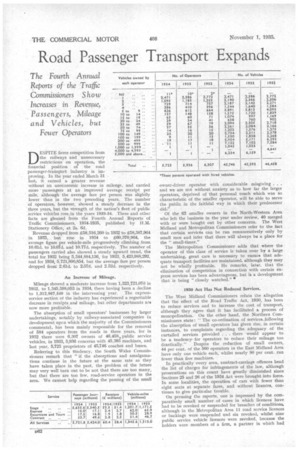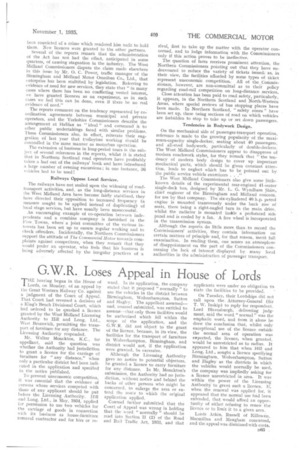Road Passenger Transport Expands
Page 120

Page 121

If you've noticed an error in this article please click here to report it so we can fix it.
The Fourth Annual Reports of the Traffic Commissioners S how Increases in Revenue, Passengers, Mileage and Vehicles, but Fewer Operators
DESPITE fierce competition from the railways and unnecessary restrictions on operation, the financial position of the road passenger-transport industry is improving. In the year ended March 31 last, it earned a greater revenue without an uneconomic increase in mileage, and carried more passengers at an improved average receipt per mile, although the average fare per person was slightly lower than in the two preceding years. The number of operators, however, showed a steady decrease in the . three years, but the strength of the nation's fleet of public service vehicles rose in the years 1933-34. These and other facts are gleaned from the Fourth Annual Reports of Traffic Commissioners, 1934-1935, published by H.M. Stationery Office, at 2s. 6d.
Revenue dropped from 258,516,260 in 1932 to 258,387,964 • in 1933, but rose in 1934 to 260,370,964, the • average figure per vehicle-mile progressively climbing from 10.61d. to 10.67d. and 10.77d. respectively. The number of passengers carried also showed a steady upward trend, the total for 1932 being 5,344,884,136, for 1933, 5,423,988,292, and for 1934, 5,721,800,854, but the average fare per person dropped from 2.61d. to 2.57d. and 2.52d. respectively.
4,000 to 4,999 ..
5,000 and above..
Total .. .,
An Increase of Mileage.
Mileage showed a moderate increase from 1,323,721,070 in 1932, to 1,345,598,053 in 1934, there having been a decline
to 1,312,967,540 in the intervening year. The expressservice section of the industry has experienced a regrettable decrease in receipts and mileage, but other departments are HOW more profitable.
The absorption of small operators' businesses by larger undertakings, notably by railway-associated companies (a development upcn which the majority of the Commissioners comments), has been mainly responsible for the removal of 584 operators from the roads in three years, for in 1932 there were 6,307 owners of 46,458,.public service vehicles, in 1933, 5,936 concerns with 45,393 machines, and last year, 5,723 proprietors of 45,746 coaches and buses.
Referring to this ttndency, the South Wales Commissioners remark that "if the absorptions and amalgamations continue in the future at the same rate as they have taken place in the past, the problem of the future may very well turn out to be not that there are too many, but that there are too few, road-service operators in the area. We cannot help regarding the passing of the small owner-driver operator with considerable misgiving . . and we are not without anxiety as to how far the larger operators, deprived of that personal touch which was so characteristic of the smaller operator, will be able to serve the public in the faithful way in which their predecessor did.".
Of the 63 smaller owners in the North-Western Area who left the business in the year under review, 40 merged with or were bought out by other concerns. The West Midland and Metropolitan Commissioners refer to the fact that certain services can be run remuneratively only by small men and infer that there will always be a place for the " small-timer."
The Metropolitan Commissioner adds that where the operator of this class of service is taken over by a large undertaking, great care is necessary to ensure that adequate transport facilities are maintained, although they may not be wholly profitable. He remarks, later, that the elimination of competition in connection with certain express services has been advantageous, but is a development that is being "closely watched." • 1930 Act Has Not Reduced Services,
The West Midland Commissioners refute the allegation that the effect of the Road Traffic Act, 1930, has been to reduce services and to increase the cost of transport, although they agree that it has facilitated a process of monopolization. On the other hand, the Northern Commissioners state: "The co-ordination of services, following the absorption of small operators has given rise, in certain instances, to complaints regarding the adequacy of the curtailed services provided . . . there would appear to be a tendency for operators to reduce their mileage too drastically." Despite the reduction of small owners, 44 per cent, of the 560 operators in the East Midland Area have only one vehicle each, whilst nearly 80 per cent, run fewer than five machines.
In practically every area, contract-carriage offences head the list of charges for infringements of the law, although prosecutions on this count have greatly diminished since Sections 25 and 26 of the 1934 Act were brought into force. In some localities, the operation of cars with fewer than eight seats at separate fares, and without licences, continues to give particular trouble.
On perusing the reports, one is impressed by the cornpa,ratively small number of cases in which licences have had to be revoked or suspended for breaches of conditions, although in the Metropolitan Area 11 road service licences or backings were suspended and six revoked, whilst nine public service vehicle licences were revoked, because the holders were members of a firm, a partner in which had been convicted of a crime which rendered him unfit to hold them. New licences were granted to the other partners.
Several of the reports remark that the administration of the Act has not had the effect, anticipated in some quarters, of causing stagnation in the industry. The West Midland Commissioners dispute the claim made elsewhere in this issue by Mr. 0. C. Power, traffic manager of the Birmingham and Midland Motor Omnibus Co., Ltd., that enterprise has been stultified by legislation. Referring to evidence of need for new services, they state that " in many cases where there has been no conflicting vested interest, ■ ve have granted licences as an experiment, as in Such cases we feel this can be done, even if there be no real evidence of need."
The reports comment on the tendency represented by coordination agreements between municipal and private operators, and the Yorkshire Commissioners describe the arrangement at Halifax as " ideal " and commendit to other public undertakings faced with similar problems. These Commissioners also, in effect, reiterate their suggestion of last year that trolleybus working should be controlled in the same manner as motorbus operation.
The extension of business in long-period tours is the subject of several references in the reports, whilst it is stated that in Northern Scotland road operators have profitably taken a leaf out of the railways' book and have introduced a large number of evening excursions ; in one instance, 36 vehicles had to be used!
Railways Oppose Local Services.
The railways have not smiled upon the widening of roadtransport activities, and, as the long-distance services in the West Midland Area have become fairly stabilized, they have directed their opposition to increased frequency (a measure sought to be applied instead of duplicating) of local stage services, but have usually been unsuccessful.
An encouraging example of co-operation between independents and a combine company is furnished in the Five. Towns, where a joint committee of the various interests has been set up to ensure regular working and to check offenders. Incidentally, the Northern Commissioners support the attitude of The Commercial Mn toy towards complaints against competitors, when they remark that they would prefer an operator, who feels that his business is being adversely affected by the irregular practices of a
rival, first to take up the matter with the operator concerned, and to lodge information with the Commissioners only if this action proves to be ineffective.
The question of fares receives prominent attention, the Northern Commissioners pointing out that they have endeavoured to reduce the variety of tickets -issued; as, in their view, the facilities afforded by some types of ticket represent uneconomic competition.. All of the,‘CoMmissioners, however, are non-committal as to their policy regarding road-rail competition on long-distance services.
Close attention has been paid to road safety, particularly, it appears, in the Northern Scotland and North-Western Areas, where special reviews of bus stopping places have been made. In Northern Scotland, "safety zones" have been set up, these being sections of road on which vehicles are forbidden to stop to take up or set down passengers.
Tendencies in Bodywork Design.
On the mechanical side of passenger-transport operation, reference is made to the growing popularity of the maximum-capacity single-decker, seating about 40 passengers, and all-steel bodywork, particularly of double-deckers. The West Midland Commissioners appear to disapprove of modern coachwork styles, for they remark that " the tendency of modern body design to cover up important mechanical parts, which should be given constant attention, leads to neglect which has to be pointed out by the public service vehicle examiners . . ."
The West Midland Commissioners also give some littleknown details of the experimental rear-engined 41-seater single-deck bus, designed by Mr. L. G. Wyndham Shire, chief engineer of the Birmingham and Midland conceal, for use by that company. The six-cylindered 40 h.p. petrol engine is mounted transversely under the back row of seats, there being a right-angled turn in the Main drive. whilst the 'radiator is mounted inside a perforated side panel and is cooled by a fan. A free wheel is incorporated in the transmission system.
Although the reports do little more than .to record the Commissioners' activities, they contain information on certain matters of principle and, for that reason, merit full examination. In reading them, one senses an atmesphete of disappoihtment on the part of the Commissioners concerning the lack of interest displayed by. many local authorities in the administration of passenger transport.
















































































































































































